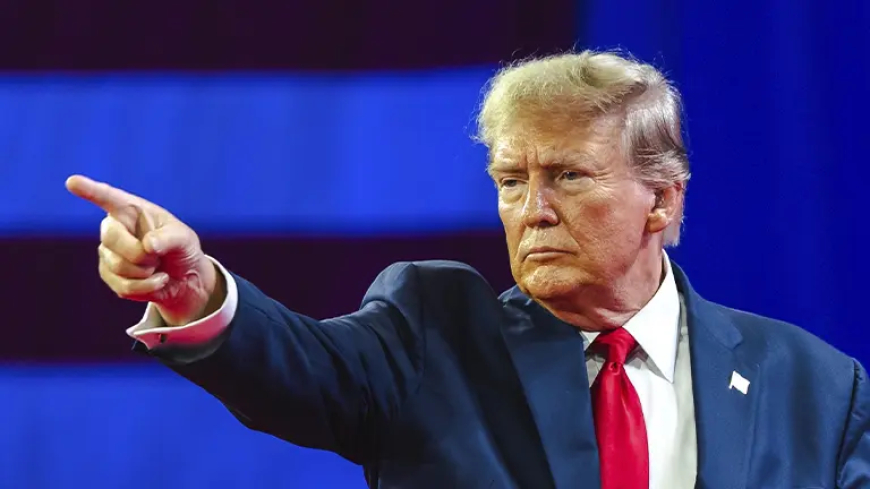Trump Warns of 10% Tariff on BRICS-Aligned Nations Amid Rising Global Tensions
President Trump issues a stark warning of a 10% tariff on nations aligning with BRICS policies. As the tariff pause nears expiration, global markets react. Effective date set for August 1.

Washington, D.C. — July 7, 2025
In a development that could reshape global trade dynamics, former U.S. President Donald Trump has issued a bold warning: any nation that aligns with what he calls the “anti-American agenda of BRICS” will face a 10% additional tariff on all exports to the United States, starting August 1. The statement, made during a press conference on Sunday evening, has sent ripples through diplomatic circles and financial markets alike.
This new policy, if implemented, will significantly heighten tensions between the United States and a growing coalition of countries that now make up BRICS, including Brazil, Russia, India, China, South Africa, and its recent additions such as Egypt, Iran, and Indonesia.
A Strategic Shift in U.S. Trade Policy
Trump’s announcement came as the current pause on international tariffs—negotiated during the late 2024 G20 Summit—nears its expiration on July 9. That temporary freeze had allowed room for backchannel diplomacy to cool tensions. But with no significant progress reported, Trump declared that the U.S. “will no longer sit back while our economic and national interests are undermined.”
“If you're standing with BRICS, you're standing against American values,” Trump said, labeling the group as “a threat to Western economic security.”
Trump’s remarks reflect a dramatic pivot back to aggressive protectionism, echoing trade policies from his earlier presidency. Analysts see this move as part of a broader strategy to rally domestic political support ahead of the 2026 midterm elections.
Why BRICS Is Under the Microscope
The announcement coincides with the 17th BRICS Summit, held this week in Rio de Janeiro, Brazil. BRICS leaders—including Indian Prime Minister Narendra Modi, Brazilian President Luiz Inácio Lula da Silva, and China’s Xi Jinping—have been openly critical of what they term Western economic dominance. The summit featured calls for restructuring global institutions, expanding the New Development Bank, and shifting trade away from U.S. dollar dependency.
While BRICS positions itself as a multipolar alternative to Western-led systems, Trump views its consolidation as a direct geopolitical challenge to American leadership. His administration accuses BRICS of enabling authoritarian regimes, violating intellectual property laws, and distorting free markets.
Who Will Be Affected?
Trump’s threat is aimed not only at BRICS founding members but also at “nations seeking entry, partnership, or trade alignment” with the bloc. This casts a wide net—potentially impacting countries like Argentina, Turkey, Saudi Arabia, and Indonesia, which have either applied for BRICS membership or initiated trade deals with the group.
If implemented, the 10% tariff would apply to all goods imported from these nations—from electronics and textiles to commodities and agricultural products. Economists warn that this could:
-
Inflate prices in the U.S. for consumer goods
-
Disrupt global supply chains
-
Trigger retaliatory tariffs
-
Intensify the global currency de-dollarization trend
Global Markets React Cautiously
The announcement has already had immediate financial repercussions. On Monday morning:
-
Dow Jones futures fell by 1.3%
-
Gold prices rose as investors sought safe havens
-
Bond yields dipped amid demand for U.S. Treasury securities
-
Asian and Latin American currencies slipped against the dollar
Market watchers say the volatility will likely increase if Trump’s administration does not offer clarity before July 9, when the current tariff suspension officially ends.
Mixed Reactions from BRICS Leaders
Brazilian President Lula da Silva responded from the BRICS Summit podium, calling Trump’s remarks “a regressive move that ignores the spirit of international cooperation.” Meanwhile, Chinese state media accused the U.S. of “economic coercion,” warning of a “long and costly trade war if such threats materialize.”
Indian officials, though more reserved, acknowledged the announcement and said they were reviewing its implications for India-U.S. relations. New Delhi has recently tried to balance ties between Washington and BRICS partners, particularly in matters of defense, energy, and technology.
Will the U.S. Congress Intervene?
While Trump’s statement stirred markets, it’s worth noting that new tariffs require congressional oversight and international trade law justification. However, under Section 232 of the Trade Expansion Act, the executive branch can impose tariffs unilaterally if national security is cited—a clause frequently used during Trump's 2017–2020 tenure.
Democrats and moderate Republicans have already voiced concerns. Senator Mark Warner (D‑VA) said in a statement, “Weaponizing trade policy for political leverage risks undermining American credibility abroad and economic stability at home.”
What Happens Next?
With the tariff deadline approaching fast—July 9 for the end of the moratorium and August 1 for implementation—observers are watching for:
-
White House clarification or rollback
-
Possible World Trade Organization (WTO) intervention
-
Coordinated BRICS response or countermeasures
-
New diplomatic channels to ease tensions
This escalation comes at a time when the global economy is already grappling with high inflation, disrupted supply chains, and the ongoing technological rivalry between the West and East.
Conclusion
President Trump’s tariff ultimatum represents a watershed moment in the already complex relationship between the United States and the BRICS alliance. Whether this policy shift becomes a flashpoint for deeper economic confrontation or a catalyst for new negotiations remains to be seen. What is certain is that the global balance of trade and power is being tested in unprecedented ways.














